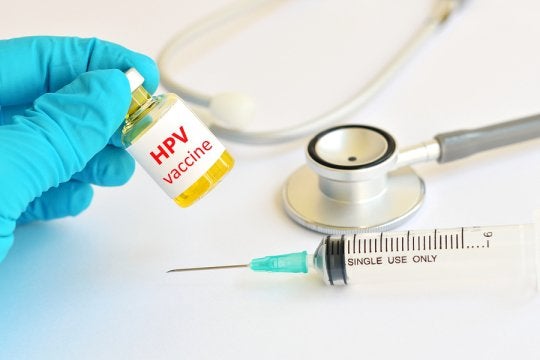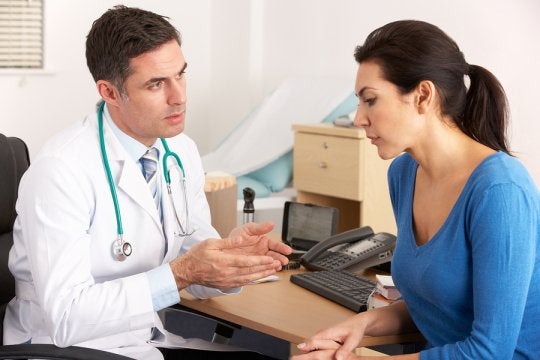-
Understanding Chemical Abortions
If you are considering pregnancy termination and you are less than six weeks along in your pregnancy by menstrual age, then your gynecologist may recommend a chemical abortion. Chemical abortions are non-invasive, but they are not right for every patient. Your gynecologist will help you weigh up the pros and cons of all of your options.

A chemical abortion is performed by administering medications that stop the pregnancy. The pregnancy is expelled in a way that is akin to having a miscarriage. Many women appreciate that a chemical abortion is non-invasive and has a shorter recovery time, but your gynecologist will consider many different factors when deciding which type of pregnancy termination meets your needs. For abortions later in the first and second trimesters, chemical procedures are not appropriate.
At Washington Surgi-Clinic, our compassionate team is dedicated to helping you make the right choices about your reproductive health, from STD testing to pregnancy termination in Washington, D.C. , with complete patient confidentiality. Make an appointment today by calling (202) 659-9403.
-
What Are the Benefits of Birth Control Pills?
The obvious benefit of birth control pills is that they help to prevent pregnancy, but they offer other advantages to women as well. Talk to your gynecologist about some of the benefits of taking birth control pills to see if they could be right for you.
Watch this video to learn about some of the advantages of taking birth control pills. In addition to pregnancy prevention, your birth control pill can make your periods lighter and more regular, help to prevent acne, and let you skip your period when you’re on vacation.
Keep in mind that birth control pills don’t provide protection against HIV or other STDs, and you will still need STD testing if you have risk factors for contracting a disease. Explore all of your birth control options by calling Washington Surgi-Clinic for an appointment with a gynecologist in Washington, D.C. You can reach us today at (202) 659-9403.
-
Common Causes of Vaginal Infections
Vaginal infections can cause itching, odor, discomfort, and painful intercourse. Although many women assume they have a yeast infection when they have symptoms of a vaginal infection and try to treat it with over the counter medications, it is important to get a definitive diagnosis from a gynecologist . Using the wrong treatment can not only fail to cure the infection but can actually make it worse. If you suspect that you have a vaginal infection, here is a look at some of the most common causes.

Yeast Infection
This type of vaginal infection is the kind with which many women are most familiar. A yeast infection occurs when there is an imbalance of bacteria happens in the vagina, allowing a type of fungus called Candida to grow. Yeast infections usually cause a thick, white discharge as well as vaginal itching and skin irritation. Over-the-counter treatments are available, but if you have persistent yeast infections, see your gynecologist to determine the cause.
Bacterial Vaginosis
Many women who think that they have yeast infections actually have bacterial vaginosis. This infection occurs as the result of falling levels of healthy, lactobacilli and increasing levels of infectious bacteria, such as Gardnerella. Bacterial vaginosis causes a thick discharge that can be either white or clear as well as a fishy odor that may be particularly noticeable during intercourse. Unlike yeast infections, bacterial vaginosis typically does not cause itching.
Trichomoniasis
Trichomoniasis —or trich, as it is often called—is a sexually transmitted infection that caused by a parasite that can be transmitted through intercourse. Trich causes redness, swelling, yellow or greenish discharge, burning, and pain during urination. Your gynecologist may treat trich with an antibiotic.
Don’t let a vaginal infection go undiagnosed and untreated. See your gynecologist at Washington Surgi-Clinic today to testing and vaginal infection treatment in Washington, D.C. We provide comprehensive gynecology and pregnancy termination services with complete confidentiality. To make an appointment or learn more, please call (202) 659-9403.
-
Breaking Down Myths About HPV
HPV, or human papilloma virus, is the most common STD in the United States, but myths about the infection still persist. These misconceptions can be dangerous, since some of the strains of HPV are known to cause cancer. If you are sexually active, talk to your gynecologist about STD testing , including testing for HPV. Here are some myths about the virus that could be affecting your health.

Myth: HPV is a woman’s disease.
HPV infections occur in both men and women. The difference is how the disease is diagnosed. In women, HPV can be detected during a Pap test. For men, no FDA-approved diagnostic test exists. Because both men and women are at risk for HPV, many doctors recommend that both groups consider getting vaccinated, when possible.
Myth: I would know if I had HPV.
Not all STDs cause symptoms, and most people with HPV don’t experience any signs of the virus at all. In some people, genital and anal warts caused by HPV appear, but the symptoms are so rare that you cannot be confident that you are free of HPV simply because you are not experiencing any signs. Likewise, you cannot look at a partner and know if he or she has HPV. The strains of HPV that cause warts tend to have lower cancer risks than the strains that don’t cause any signs at all. The only way to know for sure if you have HPV is to ask your gynecologist to perform a test.
Myth: I can’t get HPV if my partner uses a condom.
HPV can be transmitted through skin-to-skin contact, so using a condom does not protect you from HPV. Because of the way HPV is transmitted, you can also contract it from having sexual contact without having intercourse. Condoms are essential for protecting you from other STDs, but HPV can be transmitted even if you have safe sex.
Your gynecologist in Washington, D.C. at Washington Surgi-Clinic can help you understand your risk for HPV and other STDs and recommend testing and STD treatment as needed. To make an appointment, please call (202) 659-9403.
-
Recovering from a Terminated Pregnancy
Although both first and second trimester abortion procedures are safe, legal, and the right choice for many women, it is normal to experience a period of physical and emotional recovery when a pregnancy is terminated. Planning for your recovery can help you get past the procedure as quickly and easily as possible.

The nature of your physical recovery depends on whether you have a surgical or non-surgical abortion, but post-procedure pain and discomfort are common. Intermittent bleeding is also possible for up to a few weeks after the procedure. Your gynecologist will recommend methods of treating your physical symptoms. Many women also experience a range of emotions after an abortion, from relief to grief. Find a support system in your family and friends or ask your gynecologist to refer you to a support group.
The compassionate team at Washington Surgi-Clinic is dedicated to ensuring that each patient who undergoes an abortion in Washington, D.C. has access to the tools they need for a healthy physical and emotional recovery. Learn more about pregnancy termination, HIV testing, and birth control methods by calling us today at (202) 659-9403.
-
Starting a Dialog about Birth Control
For many young women, starting a conversation about birth control with a gynecologist is difficult, but the idea of discussing it with a parent seems impossible. However, many young women can benefit from talking to a parent about the birth control pill and other forms of contraception, and bringing it up may not be as scary as you think.
Watch this video for tips for starting a conversation with your mom or dad about birth control. Asking a parent to join you when you visit the gynecologist for a joint conversation or sharing an article about sexual health can be great jumping-off points.
Washington Surgi-Clinic is dedicated to empowering women of all ages to take charge of their sexual health with a comprehensive range of services, from birth control consultations to STD testing, all with complete patient confidentiality. To make an appointment for gynecology services in Washington, D.C., please call (202) 659-9403.
-
A Look at the HPV Vaccine
Human papillomavirus, or HPV, refers to several hundred different types of viruses that can cause skin warts. Approximately 40 HPVs are considered to be sexually transmitted diseases, and of these 40, about 12 are linked with increased risks of different types of cancer. Many times, HPV doesn’t cause any symptoms, so infected people pass it on to their partners without even knowing they have it. Fortunately, the HPV vaccine is now available for young girls and boys and can dramatically decrease future cancer risks for those who receive it. A gynecologist can help you determine if the vaccine is right for your child. These facts will also help.

What is the HPV vaccine?
The HPV vaccine provides protection against four types of sexually transmitted HPV, including those types responsible for approximately 70% of cervical cancer cases and 90% of cases of genital warts. The vaccine also protects against HPV strains that are associated with anal, vaginal, vulvar, penile, and oropharyngeal cancers. HPV vaccines are inactivated, which means that no live viruses are included in the vaccine.
Who should get the vaccine?
For girls, the HPV vaccine should be administered before they become sexually active, so that there is no risk of them having the virus already. A pediatrician or gynecologist may recommend giving the virus to girls between ages 11 and 12, but it is safe for girls as young as nine. Boys can receive a version of the vaccine, called HPV4, between ages nine and 26.
What are the benefits?
The HPV vaccine is not a type of contraception and does not encourage sexual activity, which are fears some parents have. The vaccine simply prevents infections when recipients do become sexually active that could later turn into cancer. According to the American Cancer Institute , nearly all cases of cervical cancer, 95% of anal cancer cases, and 65% of vaginal cancer cases are caused by HPV infections, and a vast majority of these cases could be prevented by the HPV vaccine.
Make an appointment at Washington Surgi-Clinic if you have questions about the HPV vaccine, STD testing, and HPV treatment in Washington, D.C. Please call (202) 659-9403 to schedule your visit.
-
The Benefits of The Morning After Pill
After unintended unprotected intercourse, the morning after pill, or emergency contraception, reduces the risk of an unwanted pregnancy. Morning after pills are simply high-dose birth control pills that prevent pregnancy in the same way birth control pills taken as pre-intercourse conception do, albeit for a short window of time. Although it used to be necessary to get the morning after pill from a gynecologist, it can now be purchased over-the-counter from pharmacies. It can be taken up to three days after unprotected sex, but the earlier it is taken, the more effective it is. If you have had unprotected intercourse and are concerned about an unwanted pregnancy, here is a look at some of the benefits of using the morning after pill.

Non-Invasive
The morning after pill works by preventing the ovary from releasing an egg, so that it prevents a pregnancy from occurring rather than causing a pregnancy to be terminated. This means that the pill is completely non-invasive and does not require a follow-up visit with your gynecologist or any down time. Women who take the morning after pill are able to continue with their normal activities right away.
Effective
When the morning after pill is taken correctly, it reduces the chances of unwanted pregnancy by between 80 and 90%. After taking the morning after pill, about two women in 100 will become pregnant, while approximately eight in 100 women will have a pregnancy after unprotected intercourse without the pill.
Availability
The morning after pill is easily available over-the-counter for men and women over the age of 18. There is no need to wait for a gynecologist appointment, which could reduce the effectiveness of the pill. Easy access means that women can take the pill as soon as possible.
After unprotected sex, in addition to taking steps to prevent pregnancy, you should also undergo STD testing, and when necessary, STD treatment. At Washington Surgi-Clinic, you can undergo STD testing in Washington, D.C. with complete patient confidentiality. To make an appointment, call (202) 659-9403.
-
Informing Yourself About Second Trimester Abortions
Second-trimester abortions occur between weeks 12 and 26 of pregnancy. This type of abortion may require multiple office visits, depending on the stage of pregnancy. Your gynecologist will explain what to expect at each step of the procedure.

For the first step of a second-trimester abortion, a gynecologist inserts laminaria sticks into the cervix, which cause the cervix to dilate over the course of several hours. Usually, patients receive their laminaria sticks and return home overnight to allow dilation to occur. The following morning, a gynecologist will perform a dilatation and extraction, or D&E procedure, using ultrasound guidance. General, twilight, and local anesthesia are all available to help patients stay as comfortable as possible. After the procedure, irregular bleeding may occur for a few weeks, along with cramping. Hormonal changes after the abortion may make you feel emotional.
Washington Surgi-Clinic is committed to providing access to safe, compassionate abortion services in Washington, D.C. For more information about your abortion options and other women’s health services, call (202) 659-9403.
-
The STD Testing Process
In most cases, early STD treatment helps to prevent long-term complications, so it is important to talk to your gynecologist about STD testing. Your gynecologist will ask you questions about your sexual health history and current relationships to determine what type of STD testing is right for you.
Watch this video to learn more about STD testing. Most tests can be completed simply by taking a small sample of cells, examining any vaginal discharge that is present, or performing a blood or urine test.
For STD testing in Washington, D.C., visit Washington Surgi-Clinic . We offer fast, confidential women’s health services, including STD testing and treatment. To make an appointment, please call (202) 659-9403.
Recent Posts
Popular Posts
categories
- Uncategorized
- STD
- Washington Surgi-Clinic
- Abortion
- Pregnancy
- Pap Smears
- Birth Control Options
- HPV
- Gynecologist
- Pregnancy Test
- Abortion Safety
- IUD
- Pregnancy Termination
- First Trimister
- Cervical Cancer
- Morning After Pill
- Birth Control Pills
- Chlamydia
- Birth Control Shot
- Gonorrhea
- STD Testing
- Birth Control Implant
- Pelvic Pain
- Birth Control Patch
- HIV
- HPV Vaccine
